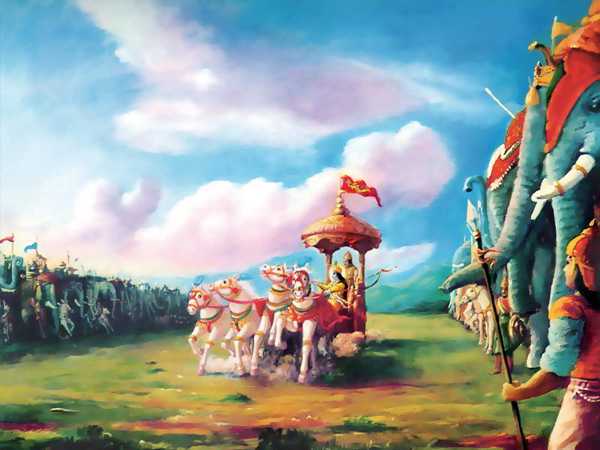Chapter 77

“The holy one said, It was only through affection that I said all this,desiring to know thy mind, and not from the desire of reproaching thee,nor from pride of learning, nor from wrath, nor from desire of making aspeech. I know thy magnanimity of soul, and also thy strength, and thydeeds. It is not for that reason that I reproached thee. O son of Pandu,a thousand times greater will be the benefit conferred by thee on thePandava’s cause than that which thou thinkest thyself to be capable ofconferring on it. Thou, O Bhima, with thy kinsmen and friends, artexactly that which one should be that has taken his birth in a familylike thine, that is regarded by all the kings of the earth. The fact,however, is that they can never arrive at the truth, who under theinfluence of doubt proceed to enquire about the consequences hereafter ofvirtue and vice, or about the strength and weakness of men. For it isseen that what is the cause of the success of a person’s object becomethalso the cause of his ruin. Human acts, therefore, are doubtful in theirconsequences. Learned men, capable of judging of the evils of actionspronounce a particular course of action as worthy of being followed. Itproduces, however, consequences, the very opposite of what were foreseen,very much like the course of the wind. Indeed, even those acts of menthat are the results of deliberation and well-directed policy, and thatare consistent with considerations of propriety, are baffled by thedispensations of Providence. Then, again, Providential dispensations,such as heat and cold and rain and hunger and thirst, that are not theconsequences of human acts, may be baffled by human exertion. Then again,besides those acts which a person is pre-ordained (as the result of theact of past lives) to go through, one can always get rid of all otheracts begun at his pleasure, as is testified by both the Smritis and theSrutis. Therefore, O son of Pandu, one cannot go on the world withoutacting. One should, hence, engage in work knowing that one’s purposewould be achieved by a combination of both Destiny and Exertion. He thatengageth in acts under this belief is never pained by failure, nordelighted by success. This, O Bhimasena, was the intended import of myspeech. It was not intended by me that victory would be certain in anencounter with the foe. A person, when his mind is upset should not losehis cheerfulness and must yield neither to langour nor depression. It isfor this that I spoke to thee in the way I did. When the morrow comes, Iwill go, O Pandava, to Dhritarashtra’s presence. I will strive to makepeace without sacrificing your interests. If the Kauravas make peace,then boundless fame will be mine. Your purposes will be achieved, andthey also will reap great benefit. If, however, the Kauravas, withoutlistening to my words, resolve to maintain their opinion, then there willundoubtedly be a formidable war. In this war burthen resteth on thee, OBhimasena. That burthen should also be borne by Arjuna, while otherwarriors should all be led by both of you. In case of war happening, Iwill certainly be the driver of Vibhatsu’s car, for that, indeed, isDhananjaya’s wish and not that I myself am not desirous of fighting. Itis for this that, hearing thee utter thy intention, I rekindled that thyenergy, O Vrikodara.'”




